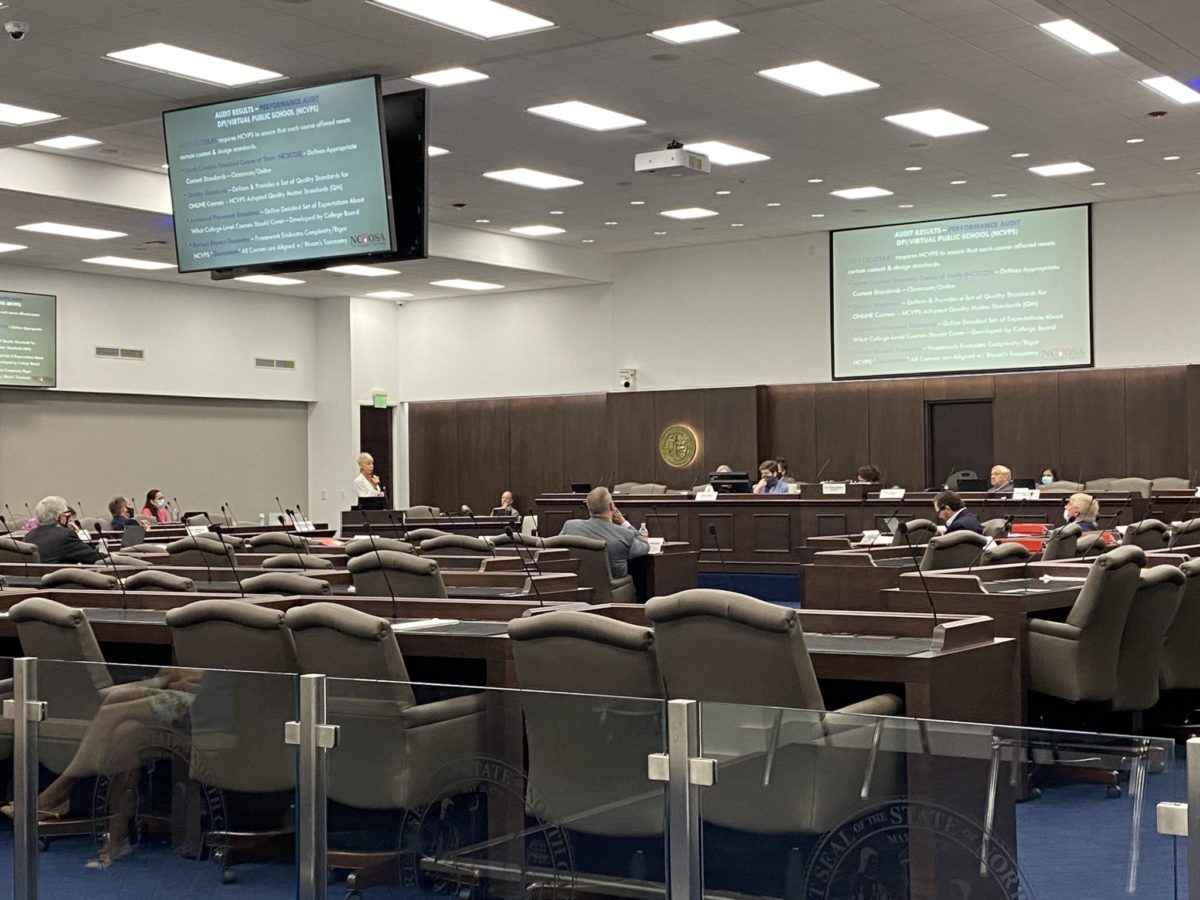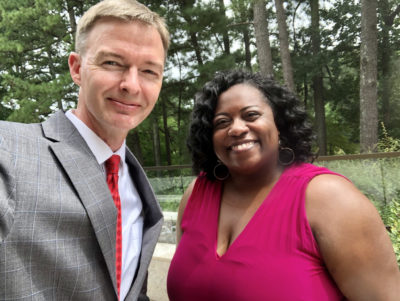
Members of the State Board of Education and state Department of Public Instruction (DPI) addressed concerns raised by an audit of the North Carolina Virtual Public School (NCVPS) during a meeting of the Joint Legislative Education Oversight Committee on Tuesday.
They said actions are underway to address the findings of the audit, which stated that the virtual school was offering courses that don’t meet content and design standards or standards of rigor, that teacher evaluations at the virtual school are inconsistent, and that some courses used third-party material without the correct citation.
“We’re grateful for (State Auditor Beth Wood’s) candor,” said State Board of Education Chair Eric Davis. “And we’ll use every item in this audit and every other audit to get better.”
Davis and Bev Emory, deputy superintendent at DPI, laid out how the issues identified in the audit have been resolved or are being worked out.
For the copyright issues and teacher evaluations, Emory said that those were addressed already in 2018 after an internal audit. A new observation tool was incorporated into observations, and teachers were trained on “copyright compliance.” In addition, “authenticity software,” was purchased which “helps us really filter for the copyright issues that were identified,” Emory said.
The audit covered 12 of 126 NCVPS course offerings. Two of those 12 have now been put through a revised internal review process, according to Emory. Emory also stated a goal to put all courses in the school through a Quality Matters Review. Quality Matters is a nonprofit that provides the “gold standard for certifying the quality of online courses and programs,” according to documents from the meeting. Putting a course through the Quality Matters process is costly and intensive, according to Emory. Currently, 22 of the 126 NCVPS courses have been certified by Quality Matters.
During the presentation, Emory also stated NCVPS’ intent to be reviewed by a peer institution or “nationally recognized association” as well as provide regular updates to the State Board of Education on issues identified by the audit.
Wood said she decided to go ahead with the audit after a family contacted her about a honors history course their daughter was taking. She said the daughter described a course with plagiarized material where the tests didn’t align with the information in the course. When the parents contacted DPI, the agency that administers the North Carolina Virtual Public School, Wood said the parents were told that their daughter was an “honors class wannabe.”
“This young lady went on to get a full ride at Wake Forest University,” Wood said.
Wood said that DPI did look into the particular course, but that she heard from parents that DPI wasn’t doing enough and that other courses at the school were problematic. So she decided to get involved.
Rep. Craig Horn, R-Union, a co-chair of the committee, told the story of his granddaughter who graduated magna cum laude from Western Carolina University. He said she took a number of NCVPS courses and loved them.
“I’m not so sure that one experience relates to another, but I don’t want to leave the people of North Carolina with the impression that NCVPS is a disaster,” he said.
Wood responded that the story she told wasn’t meant to explain the issues at NCVPS.
“The facts are here in the audit report. I’m just letting you know what got me looking at this,” she said, adding: “It’s not a story versus a story. It’s the facts in this audit supported by a subject matter expert.”
Wood said that when the audit findings were presented to DPI, the response from leaders at the organization to individual findings were sometimes irrelevant or misleading. She said that DPI also tried to discredit the subject-matter expert used by the Office of the State Auditor.
She also pointed out that an audit in 2013 identified some of the same issues with NCVPS. Sen. Tom McInnis, R-Richmond, asked Davis about that. Davis said that DPI and the State Board were committed to making sure those issues were resolved now.
McInnis said it was important to remember that education is about the children.
“We need to never lose sight of that,” he said. “And education is not fair, it’s not equal in North Carolina.”
He said in districts he represents, the virtual school courses aren’t just an option but really a necessity for his students. He also took issue with the fact that money was brought up in the presentation from DPI and the State Board.
In the presentation, Emory said that NCVPS would need $250,000 to review all the school’s courses “in a 2-3 year cycle.”
“I’m appalled that that would be brought up today. I believe that you all can find that money,” McInnis said. He suggested that money from lapsed salaries could be used.
Davis said the State Board could look at directing lapsed salary money towards that cost.
NCVPS is the second largest online virtual public school in the nation. It started in 2007.


